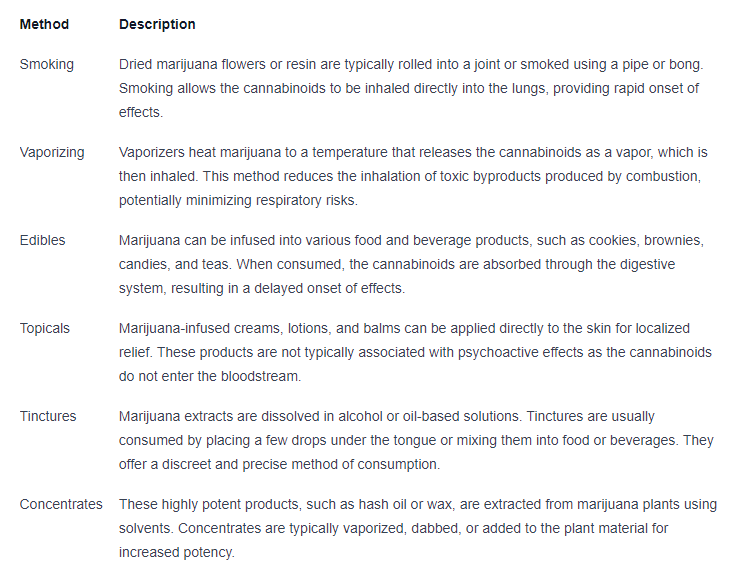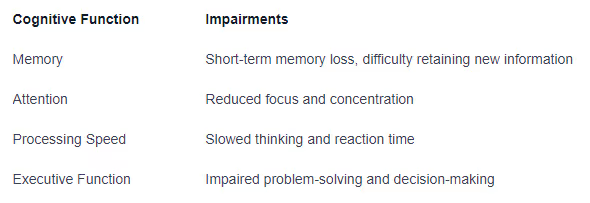Know the Negative Effects and Risks of Marijuana Use

Understanding Marijuana Use
To fully comprehend the negative effects and risks associated with marijuana use, it is essential to first have a clear understanding of what marijuana is and how it is commonly consumed.
Definition and Background
Marijuana, also known as cannabis, is a psychoactive drug derived from the Cannabis sativa plant. It contains more than 100 different chemical compounds known as cannabinoids, with delta-9-tetrahydrocannabinol (THC) being the most notable and responsible for its mind-altering effects.
Throughout history, marijuana has been used for various purposes, including medicinal, spiritual, and recreational. It has gained significant attention and controversy due to its potential therapeutic properties, as well as its negative effects on physical and mental health.
Common Methods of Use
Marijuana can be consumed through different methods, each resulting in varying effects and risks. The most common methods of marijuana use include:

Understanding the various methods of marijuana use is crucial in comprehending the effects and risks associated with each method. It is important to note that the potency of marijuana, the dosage, and individual factors can significantly influence the overall experience and potential negative effects.
Negative Effects of Marijuana Use
Marijuana use can have various negative effects on both short-term and long-term basis. It is important to understand these effects to make informed decisions regarding marijuana use.
Short-Term Effects
In the short-term, marijuana use can lead to immediate effects on physical and mental well-being. These effects may vary depending on factors such as the potency of the marijuana, individual tolerance, and the method of use.
Short-Term Effects
Euphoria
Altered perception of time
Impaired memory and concentration
Increased heart rate
Bloodshot eyes
Dry mouth and throat
Increased appetite
Coordination and motor skill impairment
It is essential to note that the short-term effects of marijuana use can impair cognitive function and motor skills, which may have implications for activities such as driving or operating machinery. The impact on memory and concentration can also affect academic or work performance.
Long-Term Effects
Long-term marijuana use can result in potential adverse effects on physical and mental health. Prolonged and heavy use of marijuana may pose increased risks compared to occasional or moderate use.
Long-Term Effects
Respiratory problems, such as chronic bronchitis or lung infections
Increased risk of cardiovascular diseases, such as heart attack or stroke
Impaired lung function
Decreased motivation and productivity
Altered brain development (in adolescents
)Increased risk of mental health disorders, such as anxiety, depression, or psychosis
It's important to note that the long-term effects of marijuana use may vary among individuals, and other factors such as genetic predisposition and co-occurring conditions can influence the outcomes. Regular monitoring of physical and mental health is crucial for individuals using marijuana over an extended period.
Understanding the negative effects of marijuana use is vital for individuals considering or currently using marijuana. Awareness of these effects can help individuals make informed decisions about their health and well-being. It's crucial to consult with healthcare professionals for personalized guidance and support in addressing any concerns related to marijuana use.
Physical Health Risks
Marijuana use can have various negative effects on physical health, impacting several systems in the body. Understanding these risks is crucial for making informed decisions about marijuana use. In this section, we will explore the potential risks to the respiratory system, cardiovascular system, and reproductive system.
Respiratory System
Marijuana smoke contains many of the same harmful chemicals as tobacco smoke. When inhaled, these chemicals can irritate and damage the respiratory system. Frequent or long-term use of marijuana can lead to respiratory issues, such as chronic bronchitis, coughing, wheezing, and increased mucus production.
One significant concern is the increased risk of respiratory infections, including bronchitis and pneumonia, among regular marijuana smokers. Additionally, marijuana smoke can also cause lung damage and impair lung function, similar to cigarette smoke.
Cardiovascular System
Marijuana use can have both short-term and long-term effects on the cardiovascular system. Shortly after using marijuana, it can cause an increase in heart rate and blood pressure, which may pose risks for individuals with pre-existing cardiovascular conditions.
Long-term marijuana use has been linked to an increased risk of cardiovascular issues, such as heart disease and stroke. The exact mechanisms behind this association are still being studied, but it is believed that marijuana use may contribute to the development or exacerbation of cardiovascular conditions in susceptible individuals.
Reproductive System
Marijuana use can have implications for both male and female reproductive health. In males, marijuana use has been associated with decreased sperm count, reduced sperm motility, and altered hormone levels, which may affect fertility.
For females, marijuana use during pregnancy can have potential risks. THC, the psychoactive compound in marijuana, can cross the placenta and affect the developing fetus. Studies have linked marijuana use during pregnancy to low birth weight, preterm birth, and developmental issues in children.
It's important to note that more research is needed to fully understand the long-term effects of marijuana use on the reproductive system. However, individuals planning to conceive or who are pregnant should exercise caution and consider avoiding marijuana use.
Understanding the physical health risks associated with marijuana use is crucial for individuals considering its use. By being aware of these potential effects on the respiratory system, cardiovascular system, and reproductive system, individuals can make informed decisions about their health and well-being.
Mental and Emotional Health Risks
Marijuana use can have various negative effects on mental and emotional health. It's important to be aware of these risks in order to make informed decisions regarding marijuana consumption. This section will explore two key areas of concern: impaired cognitive function and psychiatric disorders.
Impaired Cognitive Function
Marijuana use can impair cognitive function, affecting important mental processes such as memory, attention, and decision-making. The active compound in marijuana, delta-9-tetrahydrocannabinol (THC), can interfere with the normal functioning of the brain.

These cognitive impairments can have a significant impact on daily life, academic performance, and work productivity. It's particularly concerning for individuals who use marijuana during adolescence when the brain is still developing.
Psychiatric Disorders
Research suggests a link between marijuana use and the development or exacerbation of certain psychiatric disorders. While marijuana may not directly cause these disorders, it can increase the risk or worsen symptoms in individuals who are already predisposed.

It's important to note that the relationship between marijuana use and psychiatric disorders is complex and can vary from person to person. Some individuals may be more susceptible to the negative effects of marijuana on mental health than others.
If you have a history of mental health issues or are at risk for developing psychiatric disorders, it's essential to consult with a healthcare professional before using marijuana. They can provide personalized guidance and help you make informed decisions regarding your mental well-being.
Understanding the potential mental and emotional health risks associated with marijuana use is crucial for individuals considering or currently using marijuana. By being aware of these risks, individuals can make informed choices and prioritize their overall well-being.
Addiction and Dependency
Marijuana use can potentially lead to addiction and dependency, with individuals developing a marijuana use disorder. Understanding the risks associated with addiction and the potential withdrawal symptoms is crucial for anyone considering or currently using marijuana.
Marijuana Use Disorder
Marijuana Use Disorder (MUD) is a condition characterized by a problematic pattern of marijuana use that leads to clinically significant impairment or distress. It is recognized as a diagnosable disorder by the Diagnostic and Statistical Manual of Mental Disorders (DSM-5). The severity of MUD can range from mild to severe, depending on the number of diagnostic criteria met.
The following table outlines the diagnostic criteria for Marijuana Use Disorder:

It's important to note that not everyone who uses marijuana develops a marijuana use disorder. However, the risk of developing a disorder is influenced by various factors such as genetics, environment, and frequency of use.
Withdrawal Symptoms and Treatment
When individuals who are dependent on marijuana stop or reduce their use, they may experience withdrawal symptoms. These symptoms can vary in intensity and duration, but typically arise within the first week after quitting and may last for up to two weeks. Common withdrawal symptoms include:
- Irritability
- Insomnia
- Anxiety
- Depression
- Decreased appetite
- Restlessness
- Physical discomfort
Treatment for marijuana withdrawal is primarily focused on managing the symptoms and providing support. While there are no specific medications approved for marijuana withdrawal, healthcare professionals may employ strategies such as cognitive-behavioral therapy (CBT) to help individuals cope with cravings, address underlying issues, and develop healthy coping mechanisms.
It's important to seek professional help if you or someone you know is struggling with marijuana addiction or dependency. Healthcare professionals can provide personalized guidance and support to address the specific needs of individuals seeking to overcome marijuana use disorder.
Legal and Social Consequences
Marijuana use can have significant legal and social consequences. It's important to be aware of these implications before engaging in marijuana use.
Legal Implications
The legal status of marijuana varies across different jurisdictions. While some countries and states have legalized its use for medical or recreational purposes, others still consider it illegal. Possessing, using, or selling marijuana in areas where it is illegal can result in legal consequences, such as fines, probation, or even imprisonment.
It is crucial to familiarize yourself with the local laws and regulations regarding marijuana use to avoid any legal issues.
Impact on Relationships and Work
Marijuana use can also have social and professional consequences, particularly in the context of relationships and work. It is important to consider how marijuana use may affect your personal and professional life.
In relationships, marijuana use can sometimes lead to conflicts or disagreements, especially if one partner does not share the same view on its use. Communication and mutual understanding are essential to navigating this potential issue.
In the workplace, marijuana use can have various consequences depending on the industry and company policies. Some employers have strict drug testing policies and may have zero-tolerance for marijuana use, even if it is legal in your jurisdiction. Testing positive for marijuana use can result in disciplinary actions, including termination, and can hinder career advancement opportunities.
It is important to be aware of your workplace's policies and regulations regarding drug use and to make informed decisions that align with these guidelines.
Understanding the legal and social consequences of marijuana use is essential for making informed choices. It is important to be aware of the laws and regulations in your jurisdiction and to consider the potential impact on your relationships and work. By staying informed and making responsible decisions, you can navigate the potential risks associated with marijuana use.
Risk Factors and Harm Reduction
Understanding the factors that can increase the risks associated with marijuana use is essential for making informed decisions. Additionally, implementing harm reduction strategies can help minimize potential negative effects. In this section, we will explore the factors that increase risks and provide harm reduction strategies and resources.
Factors that Increase Risks
Several factors can contribute to an increased risk of negative effects associated with marijuana use. It's important to be aware of these factors and consider them when evaluating the potential risks:
- Age: Adolescents and young adults are particularly vulnerable to the negative effects of marijuana due to ongoing brain development. Using marijuana at a young age can impact cognitive function and increase the risk of developing other substance use disorders.
- Frequency and Quantity: Regular and heavy use of marijuana can lead to a higher risk of negative effects. The more frequently and the larger the quantity of marijuana used, the greater the potential for adverse consequences.
- Method of Use: The method of marijuana use can impact the risks involved. Smoking marijuana can have detrimental effects on the respiratory system, while consuming edibles can result in unpredictable and potentially intense psychoactive experiences.
- Pre-existing Conditions: Individuals with pre-existing mental health conditions, such as anxiety or depression, may be more susceptible to the negative effects of marijuana. It's important to consider these conditions and consult with a healthcare professional before using marijuana.
Harm Reduction Strategies and Resources
Implementing harm reduction strategies can help mitigate potential negative effects of marijuana use. These strategies aim to minimize risks and promote responsible use. Here are some harm reduction strategies and resources to consider:
- Education and Awareness: Stay informed about the effects and risks of marijuana use. Understanding the potential consequences can help you make informed decisions and reduce harm.
- Moderation: Use marijuana in moderation to decrease the likelihood of negative effects. Set limits for yourself and be mindful of your consumption patterns.
- Safe Consumption: Choose safer methods of consumption, such as vaporizing or using edibles, to reduce potential harm to the respiratory system. If smoking, consider using filters or alternative devices designed to reduce the inhalation of harmful substances.
- Know the Source: Obtain marijuana from reputable sources to ensure quality and minimize the risk of contamination with harmful substances.
- Seek Support: If you have concerns about your marijuana use or are experiencing negative effects, reach out to healthcare professionals, support groups, or helplines. They can provide guidance, resources, and support tailored to your needs.
By being aware of the factors that increase risks and implementing harm reduction strategies, individuals can make more informed choices about their marijuana use. Remember, responsible use and understanding the potential risks associated with marijuana are key to minimizing harm and promoting overall well-being.
Conclusion
Marijuana use is a complex topic with various potential risks and benefits. While some individuals may find that marijuana use enhances their quality of life, it's important to be aware of the potential negative effects and take steps to minimize harm.
Through education, responsible use, and harm reduction strategies, individuals can make informed decisions about their marijuana consumption. It's crucial to prioritize overall well-being and seek professional help if needed.
As laws and attitudes towards marijuana continue to evolve, it's essential to stay informed about the latest research and regulations. By staying informed and making responsible choices, individuals can navigate the potential risks associated with marijuana use while maximizing its potential benefits.
